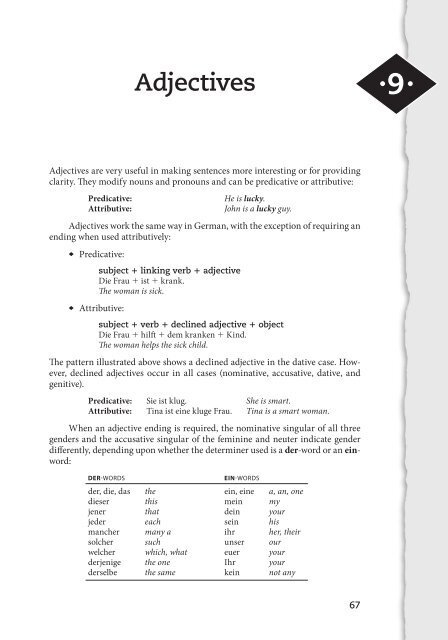german_sentence_builder
You also want an ePaper? Increase the reach of your titles
YUMPU automatically turns print PDFs into web optimized ePapers that Google loves.
Adjectives<br />
·9·<br />
Adjectives are very useful in making <strong>sentence</strong>s more interesting or for providing<br />
clarity. They modify nouns and pronouns and can be predicative or attributive:<br />
Predicative:<br />
Attributive:<br />
He is lucky.<br />
John is a lucky guy.<br />
Adjectives work the same way in German, with the exception of requiring an<br />
ending when used attributively:<br />
◆ Predicative:<br />
◆ Attributive:<br />
subject 1 linking verb 1 adjective<br />
Die Frau 1 ist 1 krank.<br />
The woman is sick.<br />
subject 1 verb 1 declined adjective 1 object<br />
Die Frau 1 hilft 1 dem kranken 1 Kind.<br />
The woman helps the sick child.<br />
The pattern illustrated above shows a declined adjective in the dative case. However,<br />
declined adjectives occur in all cases (nominative, accusative, dative, and<br />
genitive).<br />
Predicative: Sie ist klug. She is smart.<br />
Attributive: Tina ist eine kluge Frau. Tina is a smart woman.<br />
When an adjective ending is required, the nominative singular of all three<br />
genders and the accusative singular of the feminine and neuter indicate gender<br />
differently, depending upon whether the determiner used is a der-word or an einword:<br />
Der-worDS<br />
Ein-words<br />
der, die, das the ein, eine a, an, one<br />
dieser this mein my<br />
jener that dein your<br />
jeder each sein his<br />
mancher many a ihr her, their<br />
solcher such unser our<br />
welcher which, what euer your<br />
derjenige the one Ihr your<br />
derselbe the same kein not any<br />
67



